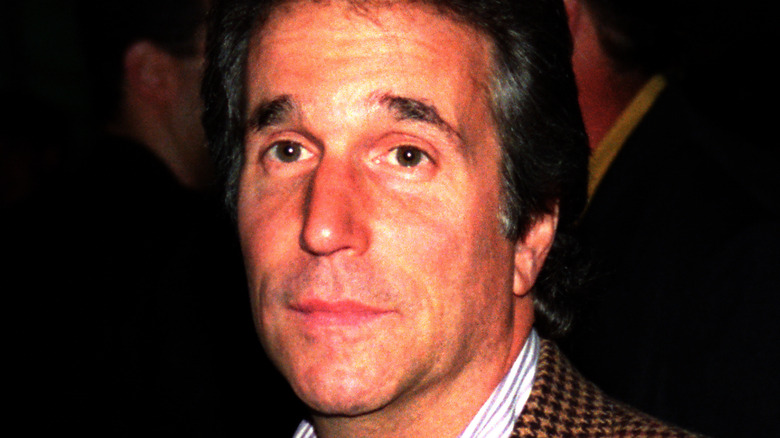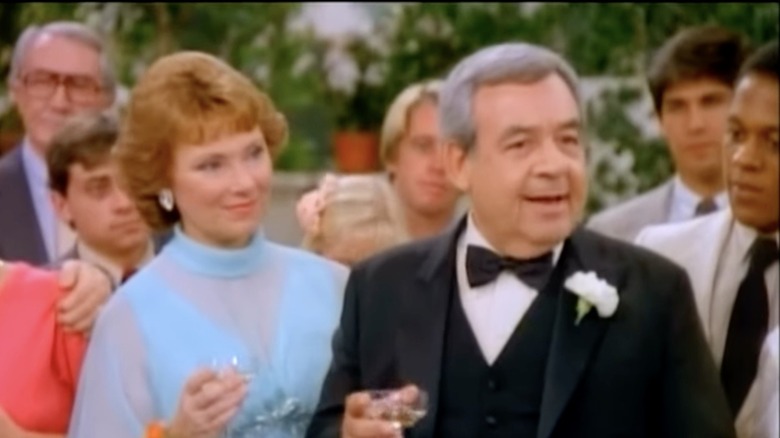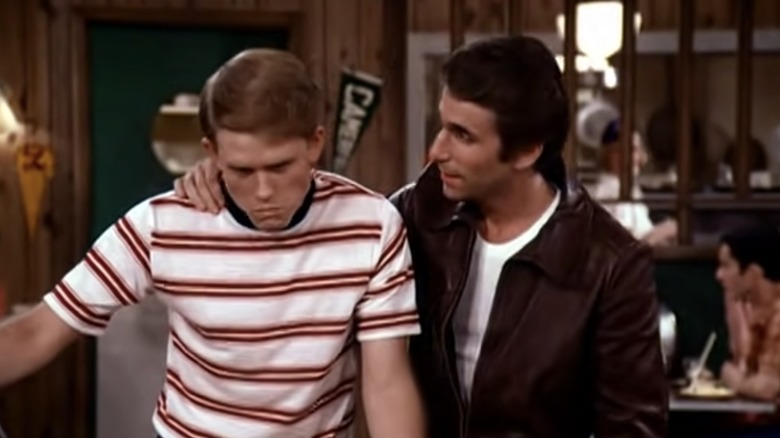The Real Reason Happy Days Was Canceled
Although it has been almost 40 years since "Happy Days" signed off America's TV screens, the television series remains an indelible part of pop culture, thanks to some of the contributions it made to the entertainment landscape — from spinoffs like "Mork and Mindy" and "Laverne and Shirley" to the star-making turns of director-actor Henry Winkler and actor Pat Morita.
The '50s-based sitcom started off with lackluster ratings following its 1974 debut, but it quickly gained a following once it dropped its more heartfelt coming-of-age storylines (via The A.V. Club) and started to focus on the Fonz's black-leather-clad character. After that, "Happy Days" became a breakout hit and received many kudos not just during its initial run but also in reruns, with the U.K.'s Metro calling it "the best sitcom ever" in 2015. Television Heaven reports that by the 1975-1976 season, "Happy Days" was the No. 1 show on TV, and that catapulted its network, ABC, to the top as well.
However, "Happy Days" was canceled after 11 seasons. That's still a pretty long run for any sitcom, but here's the real reason the much-loved show didn't last longer.
Happy Days finally ended in 1984 after 255 episodes
In 1984, "Happy Days" aired its two-part finale episode, "Passages," with a story that finally had Joanie (Erin Moran) and Chachi (Scott Baio) — who were spun off to their own unsuccessful sitcom for a season or so — reunite and decide to get married. Meanwhile, Fonzie (Henry Winkler) tries to adopt an orphan named Danny (Dan Ponce). In the end, "Happy Days" aired 255 episodes and became even more popular in syndication as it was broadcast in other countries.
During "Passages," the show also did something memorable and unexpected: Family patriarch Howard Cunningham (Tom Bosley) breaks the fourth wall. He turns to the audience, makes a toast, and says, "Thank you all for being part of our family. To happy days!" Apparently, this set up a "big hue and cry" from the network, as Bosley noted in an interview with the Television Academy Foundation, but he said he felt that the moment was meaningful.
Despite this emotional ending, "Passages" didn't end up being the last episode of "Happy Days" to air. Because of the 1984 Winter Olympics in Sarajevo, MeTV notes, "Happy Days" was pushed out of its time slot for a few weeks. Instead of moving the whole series back and airing the season finale late, the network decided to air the finale as planned and presented four missing episodes as bonus episodes.
Happy Days was the first TV show to 'jump the shark'—no, really
A more dubious contribution to pop culture that "Happy Days" made is the phrase "jumping the shark," which refers to the point at which a well-regarded TV show decreases in popularity or quality. ABC News says the term was coined in 1985, after Fonzie (Henry Winkler) notoriously water-skied over a shark tank while wearing his trademark leather jacket in the three-part episode "Hollywood" from 1977.
UCR Classic Rock and Culture points out that during the 1976-77 season, and the preceding two years, "Happy Days" had ranked in the top five TV series in the Nielson ratings. But as the 1980s arrived, its popularity waned. By 1982-1983 Fonz and the gang had dropped out of the top 20, and in the 1983-1984 season, it came in at a pretty dismal No. 63 on the ratings list.
The series' clear downward ratings trend is directly linked to the departure of fan-favorite characters like Ron Howard as Rich Cunningham and Don Most as Ralph Malph, who both disappeared after the seventh season. Mediocre storylines were also likely part of the show's fall; some fans say that the Fonz's character became too "warm and fuzzy" thanks to later-season plots that had him graduating, starting a business, and getting close to kids. "Some of the cultural changes of the new decade didn't quite align with the squeaky-clean era 'Happy Days' represented, and the show had moved away from the foundation on which its success was built," UCR said. Given the changes' corresponding drop in ratings, it's no surprise that the show's days were numbered.


